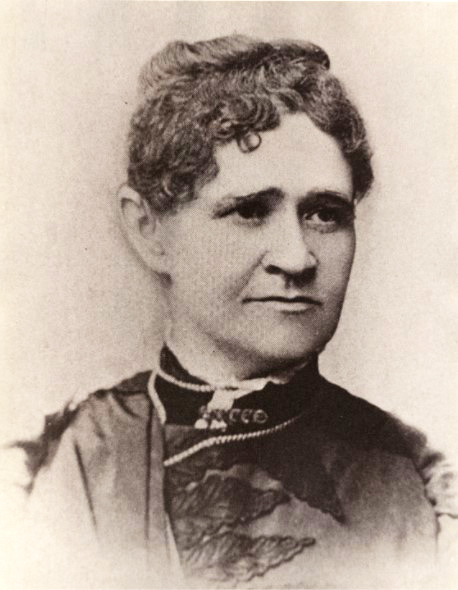“The contest for the post office is growing hotter every day.”
Janesville Gazette, February 6, 1869
After Lavinia Goodell became Wisconsin’s first woman lawyer, she served as a mentor to other women looking to enter the legal profession. The life and career of Kate Kane, the second Wisconsin woman admitted to the bar, is chronicled here. The third woman admitted to practice law in Wisconsin was also from Janesville and enjoyed a close relationship with Lavinia.

Angela Josephine King was born in Ohio in 1845. Her family moved to Janesville when she was an infant. In 1867 she graduated from the Janesville Ladies’ Seminary, which encouraged independence of thought in its young ladies in addition to stressing culture, refinement, and high moral character.
After graduation, Angie took a job as a clerk at the Janesville post office, where her brother, John Douglas King, was the assistant postmaster. When General Grant won the 1868 presidential election, it was assumed that he would appoint a new Janesville postmaster. A special election was called for February 1869, at which all Republicans receiving their mail at the Janesville post office would be entitled to vote. (Presumably the election was limited to Republican electors because Republican President Grant would only appoint someone from his own party.) The understanding was that the candidate receiving the largest number of votes would also win the endorsement of Congressman Benjamin Hopkins, a prerequisite to Grant’s appointment.
A large number of candidates vied for the position, the most prominent aspirant being James Burgess, a former postmaster. Angie King’s friends urged her to join the race, and though she had misgivings due to her lack of political experience, twenty-four year old Angie agreed and soon found herself caught up in a fast paced and sometimes dirty campaign.
The February 6, 1869 Janesville Gazette announced that “the contest for the post office is already hot and is growing hotter every day.” Burgess and his supporters tried to ensure his victory by getting the Gazette to print articles critical of Burgess’s opponents, but the Gazette’s editor refused, saying, “It is the misfortune of some men who are crazy after office, to imagine that the freedom of the press is subverted, unless its whole influence is turned to their private benefit, and to the detriment of the interests of all others who stand as obstacles in the way of results they desire to accomplish.”
Angie conducted an effective campaign, handing out leaflets, issuing press releases, and making appearances at social gatherings. The election lasted for two days in February and was heralded as the most exciting local contest in the history of Janesville. On February 15, 1869 the Gazette proclaimed, “The Burgess post office election resulted in the defeat of that gentleman by Miss Angie King by a majority of 42.”
Angie had won the popular vote but did not yet have the job. Armed with her certificate of election, she traveled to Washington, D.C. and sought a meeting with Congressman Hopkins. Although Burgess had been a political rival, Hopkins believed that endorsing a woman for the position was simply too radical, and he declined to do so. As a last resort, Angie requested an interview with President Grant. He knew nothing about her case and refused to make any appointment without Hopkins’ endorsement.
Angie returned to Janesville to await further developments. As it turned out, President Grant allowed the current postmaster to serve out his term, so although Angie did not get the appointment, neither did Burgess. However, a short time later, Angie suffered another indignity when she was removed from her job as post office clerk. The Gazette expressed its disgust, saying she had been removed by those who “succeeded in cheating [her] out of the appointment for which the people had expressed a most decided wish in her favor. If such conduct is manly, we have got to learn it. The will of the people is the law of the land.”
Angie remained at home for the next two years. In 1871, she entered the Chicago law school but after the Chicago fire, she returned home to care for her blind sister, Mary, and worked in the bookstore run by her brother, Robert. The bookstore was next door to the post office, on West Milwaukee Street.

The bookstore may have been the place where Lavinia Goodell met Angie King. Angie’s name first appeared in Lavinia’s December 22, 1874 diary entry: “In morning went to Miss King’s and bought book and diary.” The two women obviously hit it off since beginning in 1875 Lavinia reported having frequent contact with her new acquaintance. The national media’s reaction to Angie’s quest to become postmaster and her admittance to the bar and short-lived partnership with Lavinia will be explored in future posts. NK
Sources consulted: Portrait and Biographical Album of Rock County, Wisconsin (Chicago: Acme Publishing Company, 1889); Janesville Gazette, February 1869; Lavinia Goodell’s diaries.







